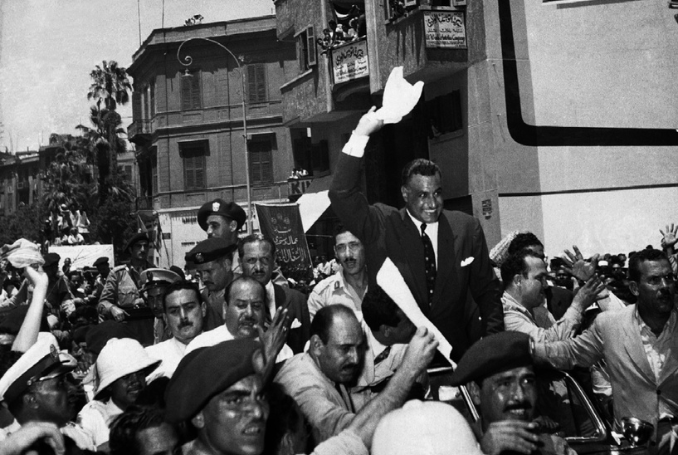By Ilan Pappe
 Egyptian Prime Minister Nasser cheered in Cairo. (Photo: via Wikimedia Commons)
Egyptian Prime Minister Nasser cheered in Cairo. (Photo: via Wikimedia Commons)
Nasser miscalculated Israel’s reaction. Though the Israeli government knew full well that Nasser did not intend to go to war, they used his brinkmanship as a pretense to start a war of their own, with the aim of building a mini-empire, a greater Israel.
June is the month when one recalls the June 1967 war.
Historians re-evaluate an event not only based on new evidence. Their analyses are also influenced by the passage of time, which enables them to reconsider different aspects of formative events such as this one.
And when you probe into history and use documents and solid evidence, you sometimes disappoint friends and enemies alike.
In this piece, I would like to revisit the role of former Egyptian President Gamal Abdul Nasser in that war. His role, I think, does not always match everyone’s perceptions of this great leader, and maybe disappoints perceived evaluations of his contributions to the struggle.
Nasser, Palestine and Israel
Here, I write from a Palestinian perspective, in the sense that I am less interested in what happened to Egypt because of Nasser’s role in Palestine – undoubtedly a worthy topic. Instead, I am interested in the Egyptian leader’s impact on the history of modern Palestine.
Nasser came to power as part of the Free Officers movement in the July 1952 Revolution. Very soon after, he settled in his office as deputy leader of the movement, before taking over the leadership from Muhmad Naguib.
Even as a deputy, he was interested in negotiating with Israel. He used a senior diplomat in France to initiate talks with the Israelis. His counterpart was Moshe Sharett, at the time Israel’s Foreign Minister.
Nasser saw the Nakba, indeed, as a catastrophe. He believed strongly in the right of the Palestinian refugees to return and deemed Israel as a huge threat to the Arab world. But Nasser was also a pragmatist who understood well how Israel became an essential part of the American imperialist set-up in the Arab world, thus sought ways to limit its potential danger.
Back then in 1952, Nasser did not necessarily deem the United States as the arch-enemy of progressive Arab regimes and was hoping that a realistic approach towards Israel would curry favor with the Americans.
In 1952, he made reasonable twin demands, and was surprised to learn that both Britain and the US found acceptable: An unconditional return of Palestinian refugees; and a land bridge through the south of the Naqab (the Negev) linking Jordan and Egypt. In return, he was willing to agree to a non-aggression pact with Israel and, eventually, peace.
Ben Gurion and His Two Cronies
The Israeli Prime Minister at the time, David Ben Gurion, categorically rejected any contact with the Egyptian leader. In fact, from the moment it was clear that Nasser would be the leader of Egypt, Ben Gurion searched for a way of toppling him.
Sharett, on the other hand, was more forthcoming; not that he agreed to Nasser’s conditions, but he valued the very idea of negotiations and hoped to find a compromise.
For a brief period, a compromise seemed possible, when Sharett replaced Ben-Gurion as prime minister of Israel for a year and a half, between 1954-1955.
Although he was no longer in government, Ben-Gurion left behind two cronies, who, like him, believed Nasser had to be overthrown. This belief was itself an outcome of a rooted ideology according to which only a display of Israel’s ruthlessness could tame the Arabs and obliterate any pan-Arabist agenda that could be of help to the Palestinians.
One of the two cronies was the Minister of Defense, Pinchas Lavon, and the other was the Chief of the General Staff, Moshe Dayan.
The three plotted a series of actions to defeat Sharett’s desire to reach an agreement with Nasser. It began by violating the armistice agreement with Egypt by building an illegal colony on no man’s land, followed by the infamous massacre in the village of Qibyah in the West Bank.
The Qibyah massacre was carried out by an Israeli commandos unit headed by Ariel Sharon in 1953. 65 villagers were murdered, partly by blowing up their houses while they were still sleeping inside.
But the peak of this campaign was the setup of a terrorist organization of Egyptian Jews that was ordered to plant bombs in cinemas and libraries associated with Western culture, to increase the mistrust of Nasser in the eyes of the Americans.
The terrorists were caught before they were able to carry out their actions.
Ben Gurion Back in Power
Ben Gurion returned to power after a relatively brief absence. In February 1955, he sent his army into the Gaza Strip to carry out a military operation, which resulted in the killing of 37 dead Egyptian soldiers. Until that very moment, as he indicated by Nasser himself in his memoir, the Egyptian leader was open to negotiations with Israel, sticking to a position that the Americans and the British still regarded as common-sensical and doable.
When Nasser understood that the West was unwilling to exert pressure on Israel and would not lift a finger to stop Israel’s colonial, annexationist ambitions towards the Arab world, he changed course. He now believed that Israel would attack both Syria and Jordan to expand its geographic boundaries. That called for a new way of thinking.
Nasser’s New Strategy
Then, Nasser embarked on a new strategy, which included more visible support for the nascent Palestinian guerrilla resistance efforts against Israel, attempts at pan-Arab unity, the creation of a non-alignment bloc with India and Yugoslavia, and purchasing more modern arms for his army.
On top of all these policies, he opted for what is known as brinkmanship policy – using war rhetoric and seemingly preparation for war, with the hope that this would be enough to force the West to exert pressure on Israel to cease its aggression.
This strategy included the closure of the Tiran straits connecting the Red Sea to the Gulf of Aqaba, concentrating an army in the Sinai Peninsula, and asking the UN to withdraw from the border between Egypt and Israel.
But Nasser miscalculated Israel’s reaction. Though the Israeli government knew full well that Nasser did not intend to go to war, they used his brinkmanship as a pretense to start a war of their own, with the aim of building a mini-empire, a greater Israel.
The rest, as the saying goes, is history.
Declassified Documents
Recently declassified documentation from the Israeli cabinet meetings shows clearly that the Israeli leaders understood that war was not imminent and that much depended on their own actions.
In fact, one did not need to wait for the opening of the archives to reach such a conclusion. Several Israeli leaders admitted as much. One of them was Menachem Begin, who was part of the government at the time, and who told senior officers in the Israeli army:
“In June 1967 we again had a choice. The Egyptian army concentrations in the Sinai approaches do not prove that Nasser was really about to attack us. We must be honest with ourselves. We decided to attack him.”
Israel’s Need for War
As in 1948, in 1967, Israel also needed wars to fulfill the typical objectives of any settler colonial movement: having more geographical space with less native population living in it.
Since 1963, Israel had prepared comprehensive plans, waiting for the perfect movement to initiate its ‘greater Israel’ project. But Israel failed because it erroneously believed that the demographic imbalances resulting from the creation of such an entity can easily be solved by oppressing, for decades, millions of Palestinians. Since it was not possible for Israel to replicate the ethnic cleansing campaign of 1948, it opted to treat the newly occupied peoples as inmates in a huge, and ever-growing prison.
The Palestinian resistance to this monstrous policy continues to this very day.
The lesson is that, even with a leftist, Labor government, which ruled Israel between 1948 to 1977, Israel did not seek peace. To the contrary, Tel Aviv hoped to impose its will on the Arab world, by allying itself closely to the West.
The consequences of this strategy were felt beyond Palestine, whose people were the main victims of this Israeli intransigence. In fact, it impacted drastically and detrimentally the whole of the Arab World.
Unfortunately, we are still witnessing the bitter fruits of this aggression, which can only be stopped by the liberation of Palestine and the creation of a democratic state over the whole of historical Palestine, which would ensure the return of its refugees.
Only this would enable us to close this dangerous and sorrowful chapter in the history of the Arab World and, hopefully, allow all of us to begin a new and more hopeful chapter.

- Ilan Pappé is a professor at the University of Exeter. He was formerly a senior lecturer in political science at the University of Haifa. He is the author of The Ethnic Cleansing of Palestine, The Modern Middle East, A History of Modern Palestine: One Land, Two Peoples, and Ten Myths about Israel. Pappé is described as one of Israel’s 'New Historians' who, since the release of pertinent British and Israeli government documents in the early 1980s, have been rewriting the history of Israel’s creation in 1948. He contributed this article to The Palestine Chronicle.

No comments:
Post a Comment